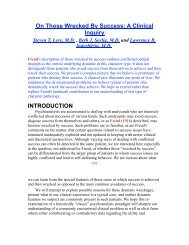A Sadomasochistic Transference - Beth J. Seelig, MD
A Sadomasochistic Transference - Beth J. Seelig, MD
A Sadomasochistic Transference - Beth J. Seelig, MD
You also want an ePaper? Increase the reach of your titles
YUMPU automatically turns print PDFs into web optimized ePapers that Google loves.
The first observation to make an inroad into the patient's rageful insistence on<br />
unanimity was the analyst's (oft-expressed) statement that she (Miss T.) felt the<br />
analyst failed to understand her in a fundamental way. This statement was itself<br />
extremely difficult for Miss T. to hear and accept because when the analyst said,<br />
"you feel that I don't understand you," Miss T. interpreted this to mean, "You feel<br />
that I don't understand you, but I do; your feeling that I don't is wrong." Gradually,<br />
over some months, the analyst was able to point out that her sense of being<br />
misunderstood served as a source of secret gratification (just as for the<br />
masochistic-narcissistic patients Cooper [1988] described, "being disappointed or<br />
refused becomes the<br />
- 973 -<br />
preferred mode of narcissistic assertion" [p. 128].) Gradually, Miss T. became able<br />
to scrutinize her own behavior for longer periods of time, without diverting the<br />
focus by angry accusations directed at the analyst.<br />
Although she was unable to utilize clarifications, let alone interpretations,<br />
during her rages, Miss T. slowly came to acknowledge, during her calm periods,<br />
the truth of the observation that she had radically different perceptions of people<br />
depending on whether she was calm or in an affective storm. She began to see that<br />
these strikingly differing perceptions of the analyst and of other people were part<br />
and parcel of her different perceptions of herself. When she was angry, she hated<br />
her analyst and believed the analyst to be evil while she herself was good. When<br />
she was not angry, she liked and sometimes even loved the analyst and thought<br />
herself a bad patient, but when she became angry again the affectionate feelings<br />
made her feel like a fool who had been duped by false promises. As these elements<br />
of the transference became clearer to Miss T., she began to feel that she and the<br />
analyst could be allies in an attempt to understand the terrifying rage and the sense<br />
of desolation she had struggled with her entire life and which were now activated<br />
in the transference.<br />
Session 177<br />
Miss T.:<br />
I had a terrible day and a terrible night. I don't know what I can do to<br />
get someone to believe it, I spent two hours crying and hitting myself. It's<br />
not normal … I just want to die … I really hurt. No one understands<br />
what's so terrible. No one can help. If speaking English doesn't work, so<br />
I'll do something.<br />
Analyst:<br />
What were you thinking of when you hit yourself?<br />
Miss T.:




